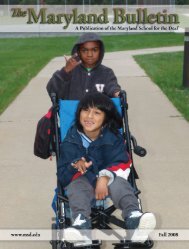Frederick Campus - Maryland School for the Deaf
Frederick Campus - Maryland School for the Deaf
Frederick Campus - Maryland School for the Deaf
Create successful ePaper yourself
Turn your PDF publications into a flip-book with our unique Google optimized e-Paper software.
11. Where do I go if I need to ask questions regarding ASL grammar or ASL sign-words?<br />
Like beginning English users asking fluent English users questions regarding English usage, beginning ASL<br />
signers are encouraged to ask fluent ASL signers questions regarding ASL usage. ASL resource teachers at both<br />
<strong>Frederick</strong> and Columbia campuses stand ready to help!<br />
~MSD ADMISSIONS POLICY~<br />
<strong>Frederick</strong> & Columbia <strong>Campus</strong><br />
Under <strong>the</strong> direction of <strong>the</strong> <strong>Maryland</strong> <strong>School</strong> <strong>for</strong> <strong>the</strong> <strong>Deaf</strong> (MSD) Board of Trustees, MSD provides a free, appropriate,<br />
public education (FAPE) to <strong>Maryland</strong>’s deaf and hard of hearing students who meet <strong>the</strong> MSD criteria <strong>for</strong> admission.<br />
MSD also accepts, on a tuition basis, out-of-state deaf and hard of hearing students who meet <strong>the</strong> admission criteria.<br />
Parents, legal guardians and students age 18 or older may apply <strong>for</strong> admission directly to MSD.<br />
Referrals/applicants to <strong>the</strong> MSD specialized programs must meet <strong>the</strong> specific criteria <strong>for</strong> admission listed under <strong>the</strong><br />
desired program. For specifics on <strong>the</strong>se programs refer to <strong>the</strong> upcoming sections of this chapter.<br />
A. GENERAL ADMISSION REQUIREMENTS<br />
All students must meet <strong>the</strong> general admission criteria in order to be eligible <strong>for</strong> enrollment in any of <strong>the</strong> MSD<br />
educational programs.<br />
1. Hearing Status: Applicants to MSD must have a valid audiological assessment completed by a qualified<br />
examiner. If documentation is unavailable, this service can be provided during <strong>the</strong> admission evaluation<br />
appointment. The primary disability <strong>for</strong> students who wish to enroll in MSD is deafness or hard-ofhearing.<br />
Hearing loss should be such that <strong>the</strong> student learns primarily through a visual modality. Factors<br />
such as family deafness, progressive hearing loss, auditory processing disorder language level and/or<br />
failure to thrive in an auditory environment will be taken into consideration.<br />
2. Age: Applicants must be between <strong>the</strong> ages of 3 (on or be<strong>for</strong>e August 31 st of a given school year) and 21<br />
(must begin <strong>the</strong> school year at <strong>the</strong> age of 20). Children who are transferring from Part C to Part B and<br />
who wish to continue enrollment in MSD must go through <strong>the</strong> MSD admission process prior to <strong>the</strong>ir 3year-old<br />
IEP date.<br />
3. Vision: Visually impaired students can be served at MSD provided that <strong>the</strong>ir visual limitations do not<br />
preclude <strong>the</strong> use of <strong>the</strong> visual instruction used in <strong>the</strong> classroom. Students who need special provisions<br />
such as <strong>the</strong> use of Braille or tactile manual communication are referred to <strong>the</strong> <strong>Maryland</strong> <strong>School</strong> <strong>for</strong> <strong>the</strong><br />
Blind in Overlea, <strong>Maryland</strong>.<br />
4. Intellectual Functioning: Applicants to <strong>the</strong> Common Core State Standards Curriculum must have cognitive<br />
per<strong>for</strong>mance measures of a standard score in <strong>the</strong> low average range or above and have <strong>the</strong> potential to<br />
learn in an educational environment. The MSD Enhanced Program of Services (ES) includes exceptions<br />
to <strong>the</strong> range of intellectual functioning requirement. Refer to later sections that follow:<br />
� Admission into <strong>the</strong> MSD Enhanced Program of Services (ES)<br />
� Admission into <strong>the</strong> MSD Special Needs Program (SN)<br />
In determining intellectual functioning, o<strong>the</strong>r factors are considered in addition to <strong>the</strong> applicant’s standard<br />
scores on <strong>for</strong>mal, nonverbal assessments. Adaptive behavior measures, in<strong>for</strong>mal reports from teachers<br />
and o<strong>the</strong>rs, family history, motor skills, communication abilities, achievement to date and social/emotional<br />
maturity are reviewed and considered when determining <strong>the</strong> appropriateness of a MSD program <strong>for</strong> a<br />
given student.<br />
5. Neurological Disorders: <strong>Deaf</strong> and hard of hearing students applying to MSD must be able to process<br />
in<strong>for</strong>mation linguistically and academically via <strong>the</strong> use of a visual modality. Such conditions as aphasia,<br />
central processing disorders, and auditory processing disorders would disqualify a student from<br />
admission into MSD.<br />
6. Medical Conditions: Applicants who have special medical conditions can be served at MSD provided that<br />
<strong>the</strong>ir medical condition/s allow participation in <strong>the</strong> instructional programs that are offered.<br />
Parent and Student Handbook, 2012-2013 <strong>Frederick</strong> 18






